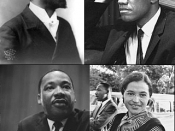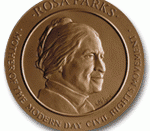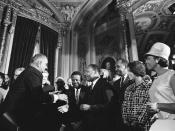Overcoming Segregation: Through a "Right" Of Passage
The American Civil Rights Movement spanning the years 1954 through 1965 was a time marked by tragedies and triumphs. Eyes on the Prize: America's Civil Rights Years, 1954-1965 by Juan Williams, provides us with a powerfully informative source of understanding of how Black America was forever changed by "the heroes and heroines, the brilliant strategies, the national politics and politicking, the violence, the people who defended segregation as Southern 'tradition,' and the unheralded people, black and white, who were the soul of the movement" (Williams, xi) Of these influential factors, legal strategy and civil rights activism, but above all the strength and courage displayed by everyday American citizens were the main contributors to the success of the movement.
One of the most influential, yet under acknowledged, architects of this strategy was a man named Charles Houston. Thurgood Marshall (former student of Charles Houston) reflects, "A large number of people have never heard of Charles Houston ⦠but when Brown v. Board of Education was being argued in the Supreme Court ⦠there were some two dozen lawyers on the side of the Negroes ⦠Of those lawyers, only two hadn't been touched by Charlie Houston ⦠That man was the engineer of all of it."
(Williams, 35) Eyes on the Prize, offers an insightful and detailed account of the life and career of this unsung hero of the Civil Rights Movement. Dedicated to improving education and services for black Americans, Houston strived to, "make the American legal system work for blacks." (Williams, 10) Houston recognized the importance of understanding the Constitution and using it as a weapon to fight the social injustices that Black Americans faced. Williams affirms, "Houston thought that the only worthy role for a lawyer was that of a civil...


